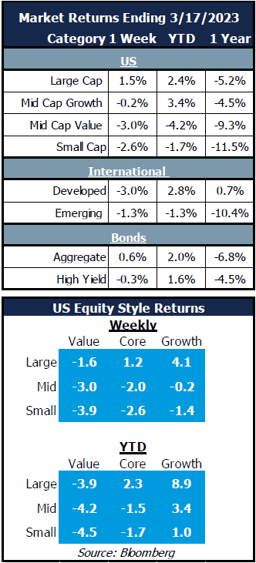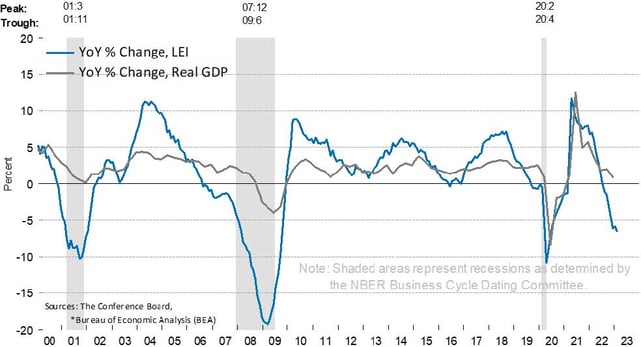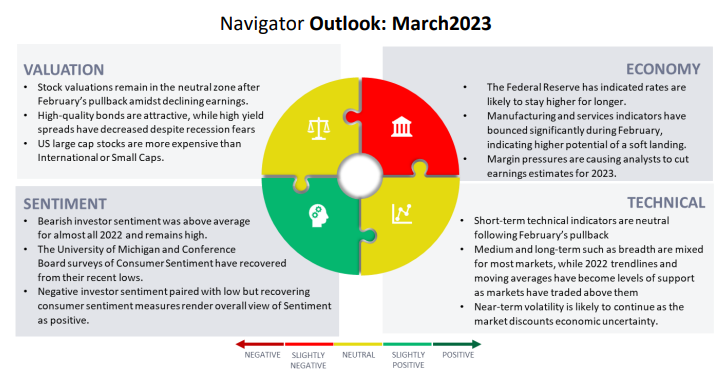Weekly Investment Update March 20, 2023
March 20, 2023 •Nathan Willis

 Key Events: Systemic Risk Fears
Key Events: Systemic Risk Fears
The collapse of Silicon Valley bank continued to ripple through the financial system.
Charles Schwab and First Republic Bank came under stress despite efforts to shore up their balance sheets; First Republic tapped a $30 Billion emergency infusion while Schwab attracted $16 Billion in deposits.
Credit Suisse was taken over by UBS over the weekend for $3.2 Billion, a fraction of its $25 Billion market value at the end of 2021, highlighting the growing stress in the European banking system.
Two key factors that are not indicative of systemic risks caused the collapse of Silicon Valley Bank:
- The bank’s deposit base was concentrated in corporate borrowers in the venture-backed technology sector; deposits declined in 2022 alongside VC funding.
- Their assets consisted of many fixed-rate mortgage securities, rather than floating-rate loans to corporations.
- The bank lost billions when the Fed hiked interest rates, exposing inadequate risk management. The bank was forced shore up the balance sheet by raising capital, triggering a bank run – depositors attempted to withdrawal $42 Billion[1] on March 10 alone, leading to collapse and contagion fears.
Market Review: Bank bailouts failed to reassure
US large cap stocks were the only area of the market that didn’t suffer last week; The S&P 500 gained 1.5% while the tech heavy Nasdaq went on a tear, up 5.8%. Small cap and international stocks all lost money.
Banks were the laggard: the KBW Bank Index lost 9.8% for the week after being down as much as 12%. International stocks performed poorly as fears of a Credit Suisse-induced European banking crisis have persisted. The MSCI EAFE was down 3% for the week.
Bonds experienced tremendous volatility during the week but high-quality bonds finished the week in the positive as rates dropped. High Yield bonds declined slightly as the banking crisis has increased the potential for recession, This risk had been growing even prior to the crisis, as can be seen in the chart below.
Outlook: Signs of instability?
These signs of instability are likely to slow the economy further as concerns over banks’ stability will likely cause lending to slow down; tightening bank lending standards is likely to be a further drag on the system and - potentially – a self-fulfilling prophecy ending in recession, or a deeper recession than we expected only a week ago.
However, there have been some significant responses to the crisis:
- The FDIC has stepped in quickly, providing a guarantee for some un-insured deposits[2]
- The Fed has provided effective backstop to the banking systems’ funding needs.[3]
- Banks stepped in to provide emergency deposits to keep First Republic on solid footing[4]
- The administration reached out to Waren Buffet, who aided Banks during ’08 crisis[5]
We would also point to the bond market, which is larger and arguably more important than the stock market – particularly when stability is a concern. Treasury Bond volatility, as measured by the MOVE index[6], has increased to levels higher than during the pandemic as the market has quickly re-priced expectations for Federal Reserve Interest rate hikes. The High Yield market, however, remains relatively calm. High yield spreads, the extra interest required for riskier bonds, have increased in the last week but remain well below Pandemic levels, indicating the bond market is not worried about a severe recession.
While the stock and bond markets are likely to remain volatile, we urge investors to remain disciplined. In all likelihood the market will absorb this blow to psychology, rewarding investors who stay the course. OneAscent portfolios remain invested at a ‘neutral’ positioning, maintaining the stock allocation in-line with long-term targets.

[1] Source: Wall Street Journal: The Banking Crisis: A Timeline of Silicon Valley Bank’s Collapse and Other Key Events - WSJ
[2] Source: Fortune: Fed: All SVB deposits get full protection, new $25 billion bank backstop | Fortune
[3] Source: CNBC: Banks take advantage of Fed crisis lending programs (cnbc.com)
[4] Source: Bloomberg: First Republic Bank (FRC) top Get $30 Billion Recue From Biggest US Banks - Bloomberg
[5] Source: Bloomberg: First Republic Bank (FRC) top Get $30 Billion Recue From Biggest US Banks - Bloomberg
[5] Source: The ICE BofA MOVE index measures the volatility of treasury options similar to how the VIX index measures equity volatility
This material is intended to be educational in nature, and not as a recommendation of any particular strategy, approach, product or concept for any particular advisor or client. These materials are not intended as any form of substitute for individualized investment advice. The discussion is general in nature, and therefore not intended to recommend or endorse any asset class, security, or technical aspect of any security for the purpose of allowing a reader to use the approach on their own. Before participating in any investment program or making any investment, clients as well as all other readers are encouraged to consult with their own professional advisers, including investment advisers and tax advisors. OneAscent can assist in determining a suitable investment approach for a given individual, which may or may not closely resemble the strategies outlined herein.
OAI00211



